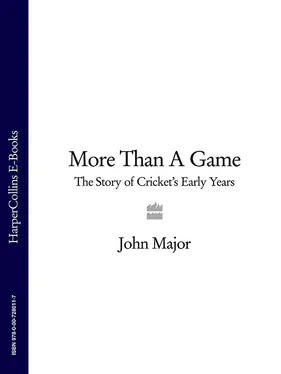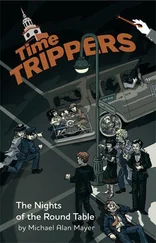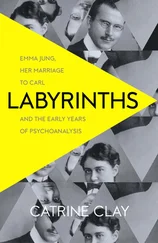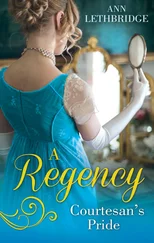The Ideal Cricket Match , by Sir Robert Ponsonby Staples (1887). (The Roger Mann Collection)
A.S. Wortley’s portrait of W.G. Grace. (The Roger Mann Collection)
The Surrey batsman W. E. Roller on his way to bat at The Oval, painted by his brother George in 1883. (Reproduced by kind permission of Surrey County Cricket Club. © The Oval Cricket Ground/Wingfield Sporting Gallery/The Bridgeman Art Library)
The noted stonewaller William Scotton. (The Roger Mann Collection)
The formidable Lord Hawke, while captain of Yorkshire. (The Roger Mann Collection)
Arthur Shrewsbury, one of the greatest batsmen in Victorian England. (The Roger Mann Collection)
Gentlemen vs Players at Lord’s (1895). (The Roger Mann Collection)
Albert Trott, the only man to have hit a ball over the pavilion at Lord’s. (The Roger Mann Collection)
Ranjitsinhji enchanted spectators with his wristy technique, and his torrent of runs for Sussex and England. (The Roger Mann Collection)
Stanley Jackson, the first man to score five centuries against Australia in England. (The Roger Mann Collection)
The mightiest of all of cricket’s great entertainers, Gilbert ‘the Croucher’ Jessop. (The Roger Mann Collection)
Victor Trumper: the majesty of his batting left spectators awe-struck. (The Roger Mann Collection)
William Murdoch, C.B. Fry and W.G. Grace at Crystal Palace in 1901. (The Roger Mann Collection)
Kent vs Lancashire at Canterbury by Albert Chevallier Tayler (1906). (The Roger Mann Collection)
Sydney Barnes, regarded by many as the finest bowler of all. (The Roger Mann Collection)
A.E.J. Collins, the Clifton College schoolboy who scored 628 not out in a house match in 1899. (The Roger Mann Collection)

All my life cricket has been a joy. My sister taught me the game when I was very young, and it met a need that has never gone away. She would bowl to me as I clutched a tiny bat and tried to defend the wicket chalked on our garage door. I was rather embarrassed by my sister’s tutelage until I learned that W.G. Grace had been taught under the eagle eye of his mother. That made me feel better, but not play better.
I have only a dim recollection of those early days, and of watching the local village side whilst my father enjoyed a game of bowls. He preferred Drake’s game to Hutton’s; but I turned my back on the bowling green and my eyes to the cricket square.
There was no coaching at my primary school, but we did play cricket. I can still relive one incident that has the power, over half a century on, to bring a hot flush of embarrassment to my face. It was a game in which for the first time I wore full whites, pads and gloves, and had my own bat. I was expected to score runs, and that made me even more nervous – caring too much rarely produces the best outcome, as I was to learn later in life. I strode to the wicket, took guard, carefully looked at the field placings, and prepared for the first ball. I played forward and felt the ball hit the middle of the bat. But the boy at first slip appealed, and the umpire/teacher squinted down the wicket, raised his forefinger theatrically and gave me out, leg before wicket. I was mortified, and without thought, stuttered, ‘But, but, I hit it!’
Uproar ensued. ‘Out,’ snarled the umpire/teacher. ‘Out. Off’ – he was now waving his arm like a windmill – ‘Off you go.’ He was right, of course, that I should not have questioned his decision. He was not right to mutter ‘Bloody boy,’ as, head down, I walked off, shamed and burning with injustice. That teacher’s angry face is imprinted forever on my mind; it is not a happy memory. But not even he could turn me away from cricket.
We are led to believe that our character is formed in our earliest years. I believe that. Joy and pain are at their sharpest when they are new. I remember trying to hide my deep disappointment that my parents were never able to see me play cricket. They had many reasons not to do so – chronic ill health, worry, the struggle to make modest ends meet when the week outran the money. They were old, too. When I was six my father was seventy, and my mother closer to fifty than forty. Both smoked, and their poor health was made worse by the foul habit. It would kill my mother in the end, but for many years before that, hacking coughs and shortage of breath were a daily occurrence. And they were exotics: our neighbourhood did not house many ex-trapeze artists, gauchos, jugglers, card-sharps or speciality dancers, and even as a boy I knew my parents were not to be judged by the usual criteria.
Once, I was certain they would come. Our school team was due to play close to our home, and I wrote out instructions for my parents on how to get there – out of our gate, turn right, then right alongside the brook, a further turn right where I went bird-nesting, and there we would be, in a field to the left. I was captain, and set a field with myself at cover-point and midwicket so that I had a clear view of the entrance gate, but neither of my parents came. My father had been doubtful anyway. He was losing his eyesight, although as a nine-year-old I was not aware of that. And my mother, who had gamely promised to come, was too ill with her interminable bronchitis. As I carried old Dr Robinson’s prescription to the chemist the following morning, I vowed I would never smoke.
Years later, Alec Bedser told me that his mother never saw him, or his twin Eric, play cricket. Not that Mrs Bedser was without opinions. When Alec took eleven wickets in his first Test match at Lord’s, the press asked for her views of her son. ‘Which one?’ ‘Alec,’ they said. ‘Why Alec?’ ‘He’s just taken eleven wickets in a Test on his debut,’ they explained. Mrs Bedser was forthright: ‘That’s what he’s paid for, isn’t it?’
As a child, cricket entered my bloodstream, and it has given me a lifetime of enjoyment and solace. Yet there are pessimists about the game. As long ago as 1932, C.P. Snow was moaning: ‘These days, a man of taste can only go to an empty ground and regret the past.’ The same dreary view can often be heard on county grounds today, as hindsight flourishes with the aid of rose-tinted spectacles.
I have never understood why we see the past as a Golden Age. It’s a false image. There was little golden about Victorian England, when children were sent scurrying up chimneys to clean them. Or Restoration England, when every portrait shows a closed mouth because a smile would have revealed rotten or blackened teeth. A cool analysis of the past will temper the rosing of the spectacles. The same is true of cricket: there have been many golden days, but the aspic of old photographs can hide the worst of times as well as the best.
As a game, cricket is complex. People who have never played are apt to say, ‘I don’t understand it.’ Much the same was said about the Impressionists, although there was nothing complicated about their art: as Claude Monet put it, ‘I simply looked at what the universe had to show us and used my brush to give an account of it.’ So too with cricket: it delights the eye and touches the soul. Part of this is physical: the smell of linseed oil on willow, the feel of ball on bat, the pleasure of holding a shiny new red ball, the clatter of disturbed stumps, the snick and catch that turns heads, and, on the best of days, the scent of newly-mown grass under the warmth of the rising sun. There is no cricketer alive who has not enjoyed these sensations, and cherished the memory of them. Lucy Baldwin, a fine cricketer and wife of Prime Minister Stanley Baldwin, put it well: ‘The crack of bat against ball amid that humming and buzzing of summer sound is still to me a note of pure joy that raised haunting memories of friends and happy days.’ Romantic tomfoolery? Perhaps. But cricket is that sort of game, and it would lose much of its charm if it were not.
Читать дальше













